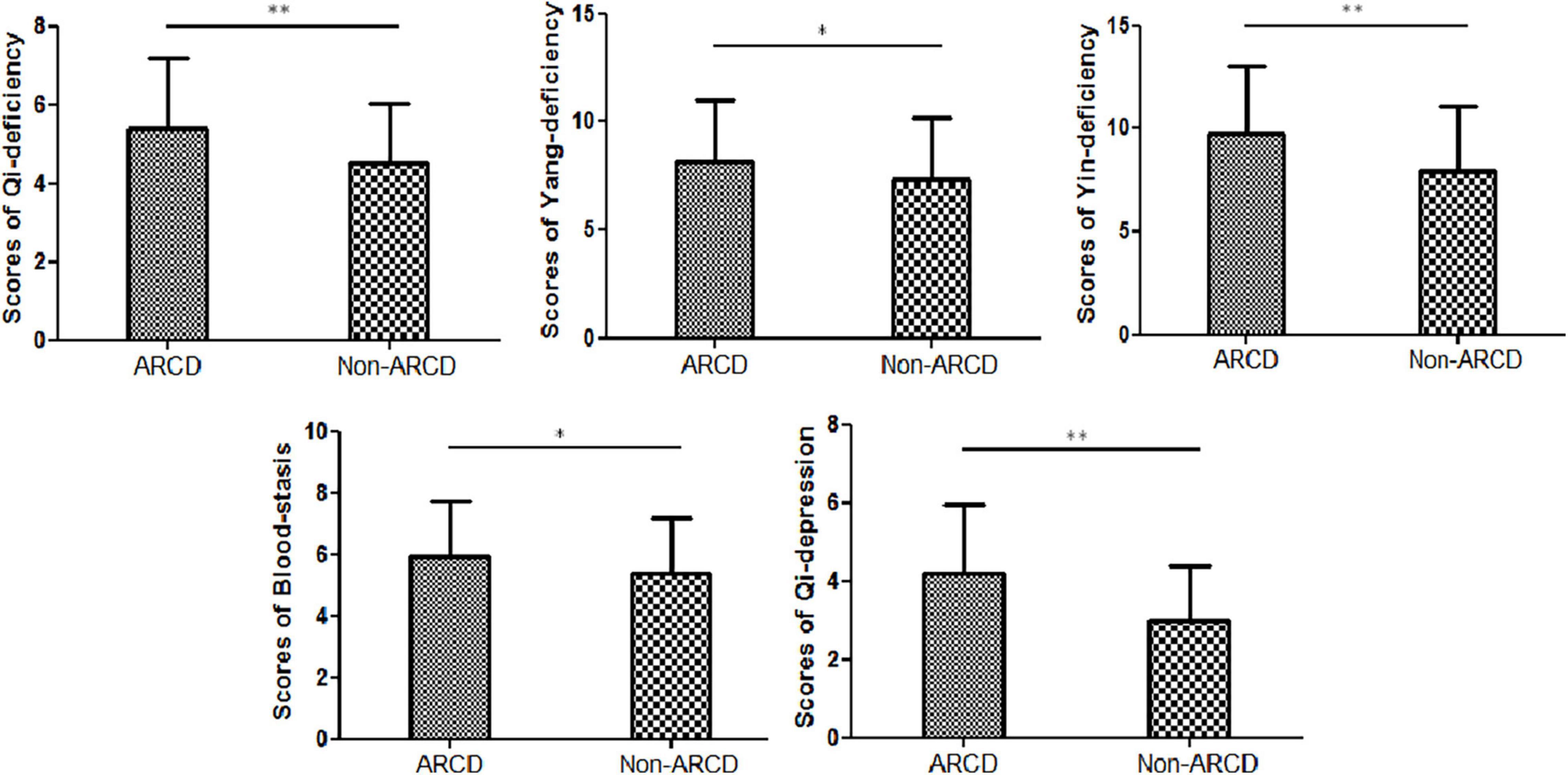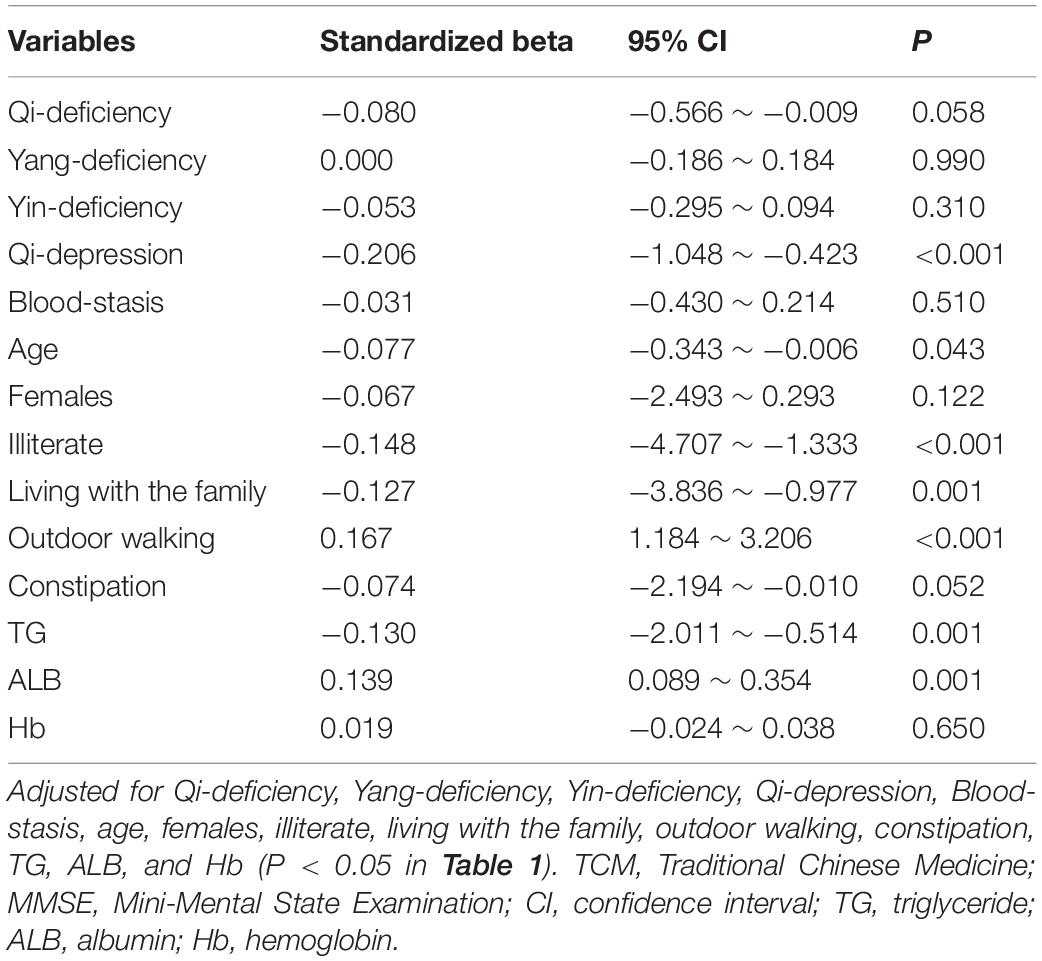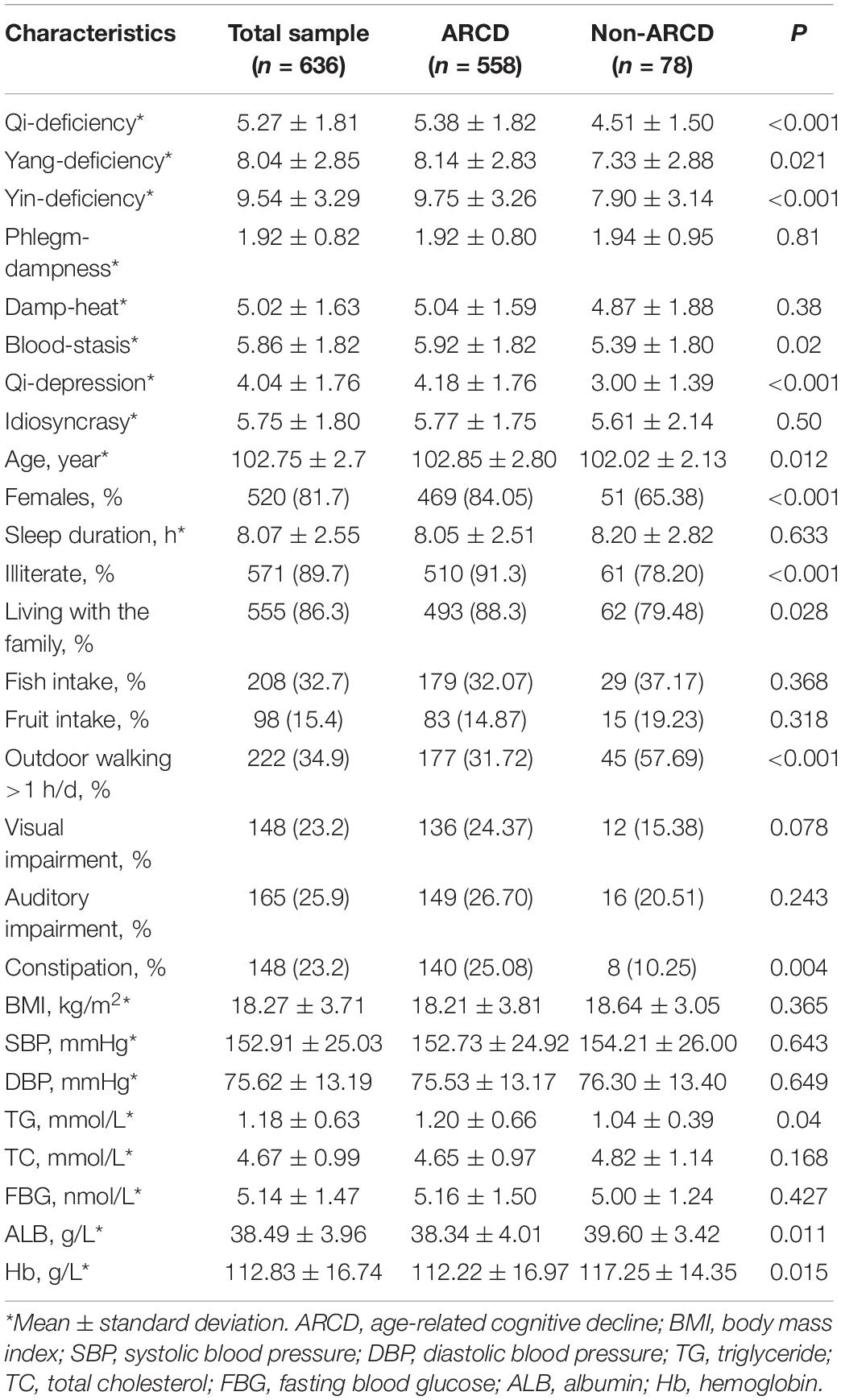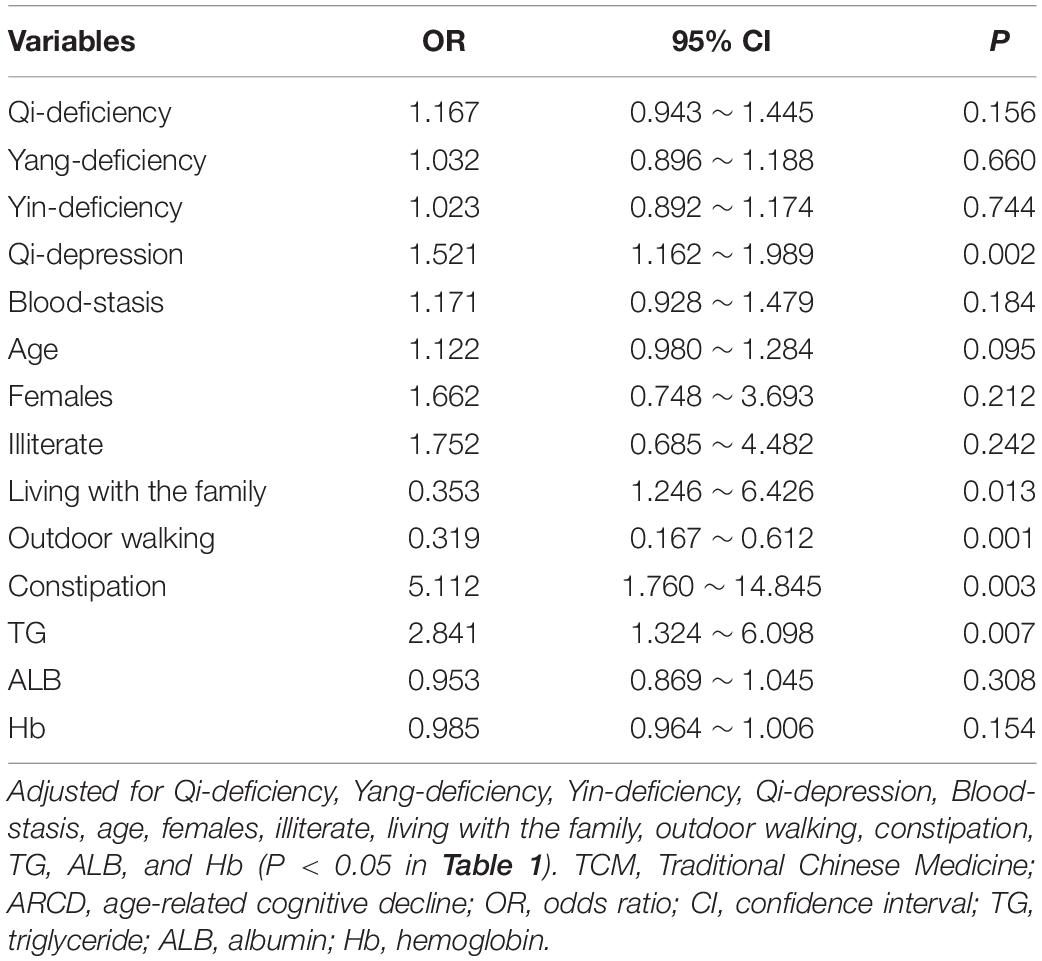- 1Department of Traditional Chinese Medicine, Hainan Hospital of Chinese People’s Liberation Army General Hospital, Sanya, China
- 2Main Station of Drug Instrument Supervision and Inspection, Chinese People’s Liberation Army Joint Logistic Support Force, Beijing, China
- 3Department of Geriatric Cardiology, Chinese People’s Liberation Army General Hospital, Beijing, China
- 4Department of Anesthesiology, Hainan Hospital of Chinese People’s Liberation Army General Hospital, Sanya, China
- 5Central Laboratory, Hainan Hospital of Chinese People’s Liberation Army General Hospital, Sanya, China
- 6Geriatrics Division, Center for the Study of Aging and Human Development, Duke University School of Medicine, Durham, NC, United States
- 7Center for Healthy Aging and Development Studies, National School of Development, Peking University, Beijing, China
- 8School of Life Sciences, Beijing Institute of Technology, Beijing, China
- 9Department of Cardiology, Hainan Hospital of Chinese People’s Liberation Army General Hospital, Sanya, China
Background: Age-related cognitive decline (ARCD) is a common condition among older adults, affecting 100 million people worldwide. Traditional Chinese Medicine’s (TCM) constitution is closely related to the occurrence and development of diseases in the elderly population. However, little is known about the relationships between TCM constitution and ARCD in the super-aged population. The present study aimed to investigate the relationships between the TCM constitution and ARCD in Chinese centenarians and to explore the application of the constitution to prevent ARCD in the elderly population.
Methods: Each participant underwent a standardized epidemiological investigation and physical examination, based on the China Hainan Centenarian Cohort Study. Data on the demographic characteristics and TCM constitution were collected using structured questionnaires.
Results: The present study included 636 centenarians aged 100–116 years. The prevalence of ARCD was 87.7% (n = 558 centenarians). In multiple linear regression analysis, an inverse relationship between Qi depression and Mini-Mental State Examination scales was significant after controlling for a wide range of other factors (P < 0.05). In multiple logistic regression analysis, Qi depression was positively associated with ARCD after full adjustment (P < 0.05).
Conclusion: As the first study in the world, the present study provides strong epidemiological evidence that Qi depression has a significant relationship with ARCD in Chinese centenarians, and regulating Qi depression may be a valuable method to prevent and treat ARCD in the elderly population.
Introduction
Age-related cognitive decline (ARCD) is a progressive neurodegenerative disease that is more prevalent in oldest-old adults than in younger adults (Kioussis et al., 2021; Liu et al., 2021). According to data from the WHO in 2017, approximately 100 million people have ARCD, and this number will further increase with the increased growth of global aging (Carman et al., 2014). ARCD has created a serious social and economic burden on society. ARCD has been clinically proven to be the prodromal stage of dementia and preventing the development of ARCD has become a popular research topic in the medical field (Gorelick et al., 2016). Unfortunately, current drugs, such as acetylcholinesterase inhibitors and non-competitive NMDA receptor modulators, are still controversial for improving cognitive function (Meng et al., 2017).
Traditional Chinese Medicine (TCM) constitution has been proposed by the academician Wang Qi and is widely used in the prevention of aging diseases (Wang, 1995). It includes Qi deficiency, Yang deficiency, Yin deficiency, Qi depression, Damp-heat, Phlegm-dampness, Blood-stasis, Idiosyncrasy, and Pinghe (Li et al., 2019). Based on the theories, the aging of the human body is marked by the gradual depression of Qi. Qi depression results in the congestion of blood circulation and accumulation of pathological products and affects learning and memory functions by inhibiting the expression of central neurotransmitters (Chiang et al., 2014; De Oliveira et al., 2014).
Extensive studies have shown that Chinese herbal compound prescriptions for regulating Qi depression can improve the forgetfulness and unresponsiveness of ARCD, such as Chaihu Shugan San (Zeng et al., 2019) and Kai Xin San (Dang et al., 2009). The mechanisms related to neuroprotection include decreasing β-amyloid precursor protein processing, inhibiting Aβ plaques, reducing oxidative stress, modulating immune function, and reducing apoptotic proteins (Lu et al., 2017; Hu et al., 2018; Liu et al., 2019). However, epidemiological research is lacking, especially in Chinese centenarians. The China Hainan Centenarian Cohort Study (CHCCS) had a considerable sample size and provided credible research opportunities. Therefore, the present study aimed to investigate the relationships between the TCM constitution and ARCD and to explore the application of the constitution to prevent ARCD in the elderly population.
Materials and Methods
Ethics Statements
The study protocol was approved by the Ethics Committee of the Hainan Hospital of Chinese People’s Liberation Army General Hospital (301hn11201601). Informed consent was obtained from all the participants and their legal guardians.
Study Population
The CHCCS, one of the largest centenarian health interdisciplinary studies, was conducted in the Hainan Province, where there is a longevity area with the highest density of centenarians in China. The CHCCS enrolled 910 centenarians older than 100 years of age between July 2014 and December 2016 from 18 cities and counties in the Hainan Province, China. The ages of the centenarians were provided and verified by the Hainan Civil Affairs Bureau. Based on a standardized protocol, in-person interviews, physical examinations, and blood analyses were conducted by a well-trained research team at the Chinese People’s Liberation Army General Hospital via home visits. This interdisciplinary research team included TCM physicians, internists, geriatricians, cardiologists, endocrinologists, nephrologists, and nurses. The research design and survey methodology have been previously described (He et al., 2018; Fu et al., 2021a,b). In summary, there were 636 centenarians with the complete data included in the final analysis.
Cognitive Function
Cognitive function was measured using the Mini-Mental State Examination (MMSE) scale with high sensitivity and specificity (Fu et al., 2018). The scale includes 30 items (1 point for correct answer, 0 point for incorrect answer, or no knowledge of the answer), including orientation, memory, attention, calculation, language, and spatial ability. The total score of the scale ranges from 0 to 30 points, and the standards of ARCD are as follows: illiteracy ≤17 points, elementary school level ≤20 points, middle school level ≤22 points, and university level ≤23 points (Creavin et al., 2016).
Traditional Chinese Medicine Constitution
Traditional Chinese Medicine constitution was assessed based on the simplified version of the academician Wang Qi’s TCM constitution questionnaire for the elderly population in combination with the actual situation in the CHCCS (Xuan, 2013; Zhu et al., 2018). This scale includes 24 pentad items, and each item scored from 1 to 5 points, covering eight constitutions, including Qi deficiency (3 items, 15 points in total), Yang deficiency (4 items, 20 points in total), Yin deficiency (4 items, 20 points in total), Qi depression (2 items, 10 points in total), Damp heat (3 items, 15 points in total), Phlegm dampness (1 item, 5 points in total), Blood stasis (3 items, 15 points in total), and Idiosyncrasy (4 items, 20 points in total). Each item in the questionnaire corresponds to a constitution, and the score is proportional to the prevalence of TCM constitution.
Concomitant Variables
Demographic characteristics, including age, sex, sleep duration (at night), education level (illiterate or above), fish intake (every day), fruit intake (more than three times a week), outdoor walking (more than 1 h a day), living with family, visual impairment (unable to live normally), auditory impairment (unable to live normally), and constipation (more than 2 days of defecation interval), were collected by strictly trained investigators using structured questionnaires and standardized procedures.
Height (H) and weight (W) were measured using a standardized scale (SeCa GmbH, Müllheim, Germany).
Body mass index (BMI) = W/H2
Systolic blood pressure (SBP) and diastolic blood pressure (DBP) were measured twice using a sphygmomanometer (Omron Hem-7200, Kyoto, Japan), with an average of two measurements used.
Blood samples of centenarians were collected by professional nurses and transported (4°C) to the central laboratory of our hospital within 4 h. Hemoglobin (Hb) levels were measured using a blood autoanalyzer (SYSMEX XS-800I, Hyogo, Japan). Plasma triglyceride (TG), total cholesterol (TC), fasting blood glucose (FBG), and albumin (ALB) levels were determined by enzyme colorimetry (Roche Products Ltd., Basel, Switzerland) using a fully automatic biochemical autoanalyzer (COBAS c702; Roche Products Ltd., Basel, Switzerland).
Statistical Analysis
Continuous variables with a normal distribution are described as mean ± SD, and those with a skewed distribution are described as median (interquartile range). Categorical variables are presented as percentages.
The t-test (mean ± SD) and the U-test (median) were used to compare the two types of continuous variables, and the chi-square test was used to compare categorical variables. Multiple logistic regression analysis was used to assess the relationships between TCM constitution and ARCD as a categorical variable, and multiple linear regression analysis was used to analyze the relationships between TCM constitution and MMSE scales as a continuous variable. Adjustments were made for age, sex, sleep duration, education level, fish intake, fruit intake, outdoor walking, social communication, visual impairment, auditory impairment, BMI, SBP, DBP, Hb, ALB, TG, TC, and FBG levels, which were significantly different between participants with and without ARCD (P < 0.05) in the t-test, U-test, or the chi-square test.
Statistical analyses were performed using SPSS 17 software package (IBM Corp., Armonk, NY, United States). Statistical significance was set at P < 0.05.
Results
The present study included 636 centenarians aged 100–116 years, including 520 women and 116 men. The proportion of centenarians with ARCD was 87.7% (n = 558). As shown in Table 1, the scores of Qi deficiency, Yang deficiency, Yin deficiency, Qi depression, and Blood-stasis were significantly higher in centenarians with ARCD than in those without ARCD (all, P < 0.05; Figure 1). Older age; female sex; higher proportions of illiterate individuals, individuals living with family, and individuals with constipation; and higher TG levels were more prominent among centenarians with ARCD than among those without ARCD (all, P < 0.05; Table 1). Centenarians with ARCD had a lower proportion of outdoor walking and lower levels of ALB and Hb than those without ARCD (P < 0.05; Table 1).

Figure 1. Traditional Chinese Medicine (TCM) constitution of centenarians with and without age-related cognitive decline (ARCD). **p < 0.01; *p < 0.05.
In multiple linear regression analysis, Qi depression, age, proportions of illiterate individuals and individuals living with family, and TG levels were inversely associated with MMSE scales, whereas the proportion of outdoor walking and ALB levels were positively associated with MMSE scales after controlling for a wide range of other factors (all, P < 0.05; Table 2). In multiple logistic regression analysis, Qi depression, proportions of individuals with constipation and individuals living with family, and TG levels were positively associated with MMSE scales, whereas the proportion of outdoor walking was inversely associated with MMSE scales after full adjustment (P < 0.05; Table 3).

Table 2. Multiple linear regression analysis between Traditional Chinese Medicine (TCM) constitution and Mini-Mental State Examination (MMSE) scales.
Discussion
As the first study in the world, we found that Qi depression was inversely associated with MMSE scales and positively associated with ARCD in Chinese centenarians. These associations were significant after adjusting for demographic characteristics and other potential confounders.
Dysfunction of memory, language, reaction, and understanding are the main clinical manifestations of dementia, which is highly consistent with Qi depression in TCM (Byers and Yaffe, 2011; Liu et al., 2012). A study (Zhang et al., 2021) in Macau, including 313 elderly people (age, 77.10 ± 8.23 years), showed that Qi depression was negatively correlated with neurocognitive scores (β = −2.66, 95% CI: −4.99 to −0.33), and it was mainly manifested in affecting vision dimensions of space capability. This finding indicates that Qi depression is closely related to ARCD, which is consistent with our study’s results. Positron emission tomography showed that cerebral oxygen metabolism in patients with Qi depression was significantly reduced, and this reduction was also related to the severity of dementia (Yu, 2006). Animal experiments have also shown that in Qi depression model rats, cell peroxidation was enhanced, and free radicals were increased, presenting as abnormal test results of the water maze and decreased cognition and learning ability (Zhu et al., 2019). In addition, previous studies have shown that traditional antidepressant prescriptions, such as Xiaoyao Powder and Chaihu Shugan Powder, could significantly increase MMSE scales and improve overall cognition (Wu, 2015; Liu et al., 2018). This mechanism is related to increased acetyl cholinesterase (AChE) content and reduced choline acetyltransferase (ChAT) expression (Wang et al., 2014), suggesting that with the development of the biological-psychological-social medical model, Qi depression caused by an accumulation of negative emotions has been proven to be closely related to the progression of cognitive decline (Zhou et al., 2006; Ismail et al., 2018; Zhang et al., 2021).
Based on the present study with relatively large sample size, it has important clinical significance for the prevention of ARCD by regulating TCM constitution in the elderly population, which is also an advantage of TCM. In the future, research can be conducted to slow down and alleviate cognitive impairment in the elderly population by regulating Qi.
While highlighting the results of this study, some limitations should be acknowledged. First, this study was based on a cross-section, hence causality could not be inferred. Second, the lack of clear biological markers for Qi depression is a difficult point in the study of the relationships between TCM constitution and ARCD.
Conclusion
The present study provides strong epidemiological evidence that Qi depression has a significant relationship with ARCD in Chinese centenarians and regulating Qi depression may be a valuable method to prevent and treat ARCD in the elderly population.
Data Availability Statement
The raw data supporting the conclusions of this article will be made available by the authors, without undue reservation.
Ethics Statement
The studies involving human participants were reviewed and approved by the Ethics Committee of Hainan Hospital of Chinese People’s Liberation Army General Hospital (301hn11201601). The patients/participants provided their written informed consent to participate in this study.
Author Contributions
YZ, YY, and SF designed the study and performed the investigation. ZS, PP, YL, and SF conducted the statistical analyses and drafted the manuscript. PZ, FL, and YZ revised the manuscript. All authors have read and approved the final manuscript.
Funding
This work was supported by grants from the National Natural Science Foundation of China (81900357 and 81941021), Military Medical Science and Technology Youth Incubation Program (20QNPY110), Excellent Youth Incubation Program of Chinese People’s Liberation Army General Hospital (2020-YQPY-007), Military Medicine Youth Program of Chinese People’s Liberation Army General Hospital (QNF19069), National Key R&D Program of China (2018YFC2000400), and National S&D Resource Sharing Service Platform Project of China (YCZYPT[2018]07). The sponsors had no role in the design, conduct, interpretation, review, approval, or control of this study.
Conflict of Interest
The authors declare that the research was conducted in the absence of any commercial or financial relationships that could be construed as a potential conflict of interest.
Publisher’s Note
All claims expressed in this article are solely those of the authors and do not necessarily represent those of their affiliated organizations, or those of the publisher, the editors and the reviewers. Any product that may be evaluated in this article, or claim that may be made by its manufacturer, is not guaranteed or endorsed by the publisher.
Acknowledgments
We appreciate all those who participated in the present study for their continued cooperation.
References
Byers, A. L., and Yaffe, K. (2011). Depression and risk of developing dementia. Nat. Rev. Neurol. 7, 323–331. doi: 10.1038/nrneurol.2011.60
Carman, A. J., Dacks, P. A., Lane, R. F., Shineman, D. W., and Fillit, H. M. (2014). Current evidence for the use of coffee and caffeine to prevent age-related cognitive decline and Alzheimer’s disease. J. Nutr. Health Aging 18, 383–392. doi: 10.1007/s12603-014-0021-7
Chiang, H. C., Chang, H. H., Huang, P. Y., and Hsu, M. (2014). On the qi-deficiency in traditional Chinese medicine, Taiwan. J. Obstet Gynecol. 53, 317–323. doi: 10.1016/j.tjog.2013.06.013
Creavin, S. T., Wisniewski, S., Noel-Storr, A. H., Trevelyan, C. M., Hampton, T., Rayment, D., et al. (2016). Mini-Mental State Examination (MMSE) for the detection of dementia in clinically unevaluated people aged 65 and over in community and primary care populations. Cochrane Database Syst. Rev. 2016:CD011145. doi: 10.1002/14651858.CD011145.pub2
Dang, H., Sun, L., Liu, X., Peng, B., Wang, Q., Jia, W., et al. (2009). Preventive action of Kai Xin San aqueous extract on depressive-like symptoms and cognition deficit induced by chronic mild stress. Exp. Biol. Med. 234, 785–793. doi: 10.3181/0812-RM-354
De Oliveira, T. C. G., Soares, F. C., De Macedo, L. D. E. D., Diniz, D. L. W. P., Bento-Torres, N. V. O., and Picanço-Diniz, C. W. (2014). Beneficial effects of multisensory and cognitive stimulation on age-related cognitive decline in long-term-care institutions. Clin. Interv. Aging 9, 309–321. doi: 10.2147/CIA.S54383
Fu, S., Hu, J., Chen, X., Li, B., Shun, H., Deng, J., et al. (2021a). Mutant single nucleotide polymorphism rs189037 in ataxia-telangiectasia mutated gene is significantly associated with ventricular wall thickness and human lifespan. Front. Cardiovasc. Med. 8:658908. doi: 10.3389/fcvm.2021.658908
Fu, S., Ping, P., Li, Y., Li, B., Zhao, Y., Yao, Y., et al. (2021b). Centenarian longevity had inverse relationships with nutritional status and abdominal obesity and positive relationships with sex hormones and bone turnover in the oldest females. J. Transl. Med. 19:436. doi: 10.1186/s12967-021-03115-7
Fu, S., Yao, Y., Lv, F., Zhang, F., Zhao, Y., and Luan, F. (2018). Associations of immunological factors with metabolic syndrome and its characteristic elements in Chinese centenarians. J. Transl. Med. 16:315. doi: 10.1186/s12967-018-1691-4
Gorelick, P. B., Counts, S. E., and Nyenhuis, D. (2016). Vascular cognitive impairment and dementia. Biochim. Biophys. Acta 1862, 860–868. doi: 10.1016/j.bbadis.2015.12.015
He, Y., Zhao, Y., Yao, Y., Yang, S., Li, J., Liu, M., et al. (2018). Cohort profile: the China Hainan Centenarian Cohort Study (CHCCS). Int. J. Epidemiol. 47, 694h–695h. doi: 10.1093/ije/dyy017
Hu, Q., Yu, B., Chen, Q., Wang, Y., Ling, Y., Sun, S., et al. (2018). Effect of Linguizhugan decoction on neuroinflammation and expression disorder of the amyloid β-related transporters RAGE and LRP-1 in a rat model of Alzheimer’s disease. Mol. Med. Rep. 17, 827–834. doi: 10.3892/mmr.2017.7983
Ismail, Z., Gatchel, J., Bateman, D. R., Barcelos-Ferreira, R., Cantillon, M., Jaeger, J., et al. (2018). Affective and emotional dysregulation as pre-dementia risk markers: exploring the mild behavioral impairment symptoms of depression, anxiety, irritability, and euphoria. Int. Psychogeriatr. 30, 185–196. doi: 10.1017/S1041610217001880
Kioussis, B., Tuttle, C. S. L., Heard, D. S., Kennedy, B. K., Lautenschlager, N. T., and Maier, A. B. (2021). Targeting impaired nutrient sensing with repurposed therapeutics to prevent or treat age-related cognitive decline and dementia: a systematic review. Ageing Res. Rev. 67:101302. doi: 10.1016/j.arr.2021.101302
Li, L., Yao, H., Wang, J., Li, Y., and Wang, Q. (2019). The role of chinese medicine in health maintenance and disease prevention: application of constitution theory. Am. J. Chin. Med. 47, 495–506. doi: 10.1142/S0192415X19500253
Liu, B., Liu, G., Wang, Y., Yao, Y., Wang, G., Lei, X., et al. (2019). Protective effect of buyang huanwu decoction on neurovascular unit in alzheimer’s disease cell model via inflammation and RAGE/LRP1 pathway. Med. Sci. Monit. 25, 7813–7825. doi: 10.12659/MSM.917020
Liu, J., Wang, L. N., and Tian, J. Z. (2012). Recognition of dementia in ancient China. Neurobiol. Aging 33:2948.e11-3. doi: 10.1016/j.neurobiolaging.2012.06.019
Liu, T., Li, N., Hou, Z., Liu, L., Gao, L., Wang, L., et al. (2021). Nutrition and exercise interventions could ameliorate age-related cognitive decline: a meta-analysis of randomized controlled trials. Aging Clin. Exp. Res. 33, 1799–1809. doi: 10.1007/s40520-020-01730-w
Liu, Z., Zhang, X., Liu, Y., Sun, Q., Zhao, Z., and Liu, X. (2018). Effects of xiaoyao pill on magnetic resonance spectroscopy of mild cognitive impairment patients with liver qi stagnation syndrome. J. Tradit. Chin. Med. 59, 1489–1493.
Lu, C., Shi, Z., Sun, X., Pan, R., Chen, S., Li, Y., et al. (2017). Kai Xin San aqueous extract improves Aβ 1-40-induced cognitive deficits on adaptive behavior learning by enhancing memory-related molecules expression in the hippocampus. J. Ethnopharmacol. 201, 73–81. doi: 10.1016/j.jep.2016.10.002
Meng, A., Nexø, M. A., and Borg, V. (2017). The impact of retirement on age related cognitive decline-a systematic review. BMC Geriatr. 17:160. doi: 10.1186/s12877-017-0556-7
Wang, H. P., Xing, X. P., Zhang, W. J., and Wu, H. Y. (2014). Effect of xiaoyao powder on the ability of learning and memory and neurotransmitter activity of Alzheimer’s disease model mice. Chin. J. Gerontol. 34, 471–474.
Wu, L. B. (2015). Clinical Observation and Experimental Study of Xiaoyaosan Treating Liver Stagnation and Spleen Deficiency Syndrome of Alzheimer’s Disease. Master Dissertation. Wuhan: Hubei University of Chinese Medicine.
Xuan, L. (2013). Development and Preliminary Application Analysis of the “TCM Constitution Scale for the Elderly”. Doctoral Dissertation. Beijign: Beijing University of Chinese Medicine.
Yu, M. (2006). The Study of Theory and Clinic about the Relativity between Stagnation of Liver- energy and Dementia. Master Dissertation. Jinan: Shandong University of Chinese Medicine.
Zeng, Q., Li, L., Siu, W., Jin, Y., Cao, M., Li, W., et al. (2019). A combined molecular biology and network pharmacology approach to investigate the multi-target mechanisms of Chaihu Shugan San on Alzheimer’s disease. Biomed. Pharmacother. 120:109370. doi: 10.1016/j.biopha.2019.109370
Zhang, Z., Chuang, Y., Ke, X., Wang, J., Xu, Y., Zhao, Y., et al. (2021). The influence of TCM constitutions and neurocognitive function in elderly Macau individuals. Chin. Med. 16:32. doi: 10.1186/s13020-021-00441-2
Zhou, L., Chen, W. K., and Mei, X. Y. (2006). Study on the characteristics of population distribution of TCM syndromes and its related factors in patients of depression. Zhongguo Zhong Xi Yi Jie He Za Zhi 26, 106–109.
Zhu, Y., Shi, Y., Cao, C., Han, Z., Liu, M., Qi, M., et al. (2019). Jia-Wei-Kai-Xin-San, an herbal medicine formula, ameliorates cognitive deficits via modulating metabolism of beta amyloid protein and neurotrophic factors in hippocampus of Aβ1–42 induced cognitive deficit mice. Front. Pharmacol. 10:258. doi: 10.3389/fphar.2019.00258
Keywords: age-related cognitive decline, Chinese centenarians, Mini-Mental State Examination, Traditional Chinese Medicine constitution, Qi depression
Citation: Sun Z, Ping P, Li Y, Feng L, Liu F, Zhao Y, Yao Y, Zhang P and Fu S (2022) Relationships Between Traditional Chinese Medicine Constitution and Age-Related Cognitive Decline in Chinese Centenarians. Front. Aging Neurosci. 14:870442. doi: 10.3389/fnagi.2022.870442
Received: 06 February 2022; Accepted: 15 March 2022;
Published: 09 May 2022.
Edited by:
Jiansong Fang, Guangzhou University of Chinese Medicine, ChinaReviewed by:
Xiude Fan, Shandong Provincial Hospital, ChinaLing-Feng Zeng, Guangdong Provincial Hospital of Traditional Chinese Medicine, China
Copyright © 2022 Sun, Ping, Li, Feng, Liu, Zhao, Yao, Zhang and Fu. This is an open-access article distributed under the terms of the Creative Commons Attribution License (CC BY). The use, distribution or reproduction in other forums is permitted, provided the original author(s) and the copyright owner(s) are credited and that the original publication in this journal is cited, in accordance with accepted academic practice. No use, distribution or reproduction is permitted which does not comply with these terms.
*Correspondence: Yali Zhao, emhhb3lsMzAxQDE2My5jb20=; Yao Yao, eWFveWFvQG5zZC5wa3UuZWR1LmNu; Pei Zhang, MTc2MDEwNTIyMzVAMTYzLmNvbQ==; Shihui Fu, eGlhb3hpYW8wOTE1QDEyNi5jb20=
†These authors share first authorship
 Zhigao Sun1†
Zhigao Sun1† Long Feng
Long Feng Yali Zhao
Yali Zhao Yao Yao
Yao Yao Pei Zhang
Pei Zhang Shihui Fu
Shihui Fu
